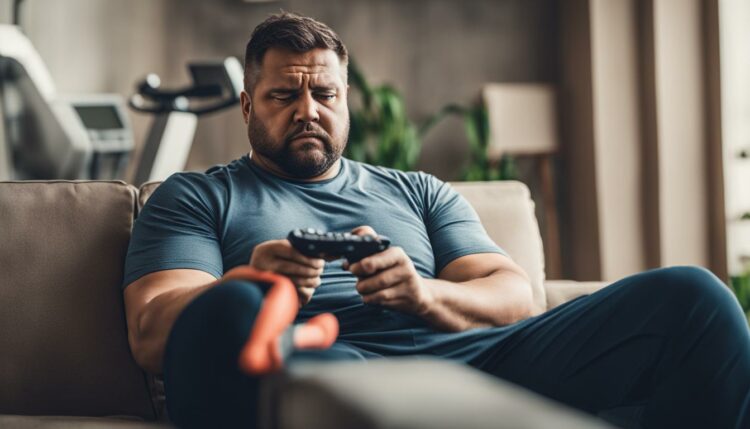Studies have shown a link between a sedentary lifestyle and erectile dysfunction (ED) in men of all ages. A sedentary lifestyle, characterized by a lack of physical activity, can lead to decreased blood flow, which is essential for achieving and maintaining an erection.
This correlation has been observed in both young, healthy men and middle-aged men. It is important to understand the negative effects of a sedentary lifestyle on erectile health and explore ways to improve wellness.
Key Takeaways:
- A sedentary lifestyle can contribute to the development of erectile dysfunction.
- Regular physical activity is crucial in maintaining healthy erectile function.
- A healthy diet plays a significant role in preventing erectile dysfunction.
- Quitting smoking, moderating alcohol consumption, and managing stress can improve sexual health.
- Seeking medical advice is essential for personalized treatment options and support.
The Association Between Physical Activity and Erectile Function in Young, Healthy Men.
A study conducted on young, healthy men aimed to assess the association between physical activity and erectile function. The study found that increased physical activity was associated with better sexual function, measured by the International Index of Erectile Function (IIEF) questionnaire.
The sedentary lifestyle was linked to increased dysfunction in various domains of the IIEF, including erectile function, orgasm function, intercourse satisfaction, and overall satisfaction. The findings highlight the importance of regular physical activity in preventing and managing erectile dysfunction.
The study revealed a strong correlation between physical activity and erectile function in young, healthy men. Those who engaged in regular physical activity experienced improved sexual function across multiple domains assessed by the IIEF questionnaire.
Physical activity plays a vital role in maintaining overall health, including sexual health. It enhances blood flow, promotes cardiovascular fitness, and helps prevent chronic health conditions, which can negatively impact erectile function.
By incorporating physical activity into their lifestyle, men can reduce the risk of developing erectile dysfunction and improve their sexual well-being.
“The findings of this study provide further evidence that physical activity is crucial for maintaining good erectile function in young, healthy individuals. It emphasizes the importance of leading an active lifestyle to prevent and manage erectile dysfunction.”
To illustrate the relationship between physical activity and erectile function in young, healthy men, refer to the following table:
| Physical Activity Level | Erectile Function Score (IIEF) |
|---|---|
| Inactive (sedentary lifestyle) | Lower scores in all domains of the IIEF |
| Moderate physical activity | Higher scores in erectile function, orgasm function, intercourse satisfaction, and overall satisfaction |
| High physical activity | Highest scores in all domains of the IIEF |
This table clearly demonstrates how physical activity influences erectile function in young, healthy men. Those with higher levels of physical activity exhibit better scores in all domains of the IIEF, indicating a stronger sexual function overall.
In summary, the study highlights the significant impact of physical activity on erectile function in young, healthy men. Engaging in regular physical activity is essential for maintaining good sexual health and preventing the development of erectile dysfunction.
By incorporating exercise into their daily routines, individuals can take proactive steps towards improving their overall well-being and sexual satisfaction.
The Role of Lifestyle Choices in Erectile Dysfunction.
Lifestyle choices play a significant role in the development and worsening of erectile dysfunction (ED). Several factors, including a sedentary lifestyle, unhealthy diet, smoking, excessive alcohol consumption, and high levels of stress, can contribute to this condition’s onset and progression.
A sedentary lifestyle, characterized by a lack of physical activity, can lead to reduced blood flow, which is essential for achieving and maintaining an erection. The decreased blood flow to the penis can make it challenging for men to achieve satisfactory sexual performance.
Moreover, an unhealthy diet, particularly one high in saturated fats, sugars, and processed foods, can contribute to obesity, heart disease, and diabetes. These conditions are known risk factors for erectile dysfunction.
Smoking and excessive alcohol consumption directly affect blood flow to the penis, further impairing erectile function. Nicotine and other harmful substances in cigarettes can damage blood vessels and restrict blood flow, while alcohol can act as a depressant and negatively impact sexual performance.
Additionally, high levels of stress and anxiety can interfere with sexual arousal and performance, exacerbating erectile dysfunction. Stress triggers the release of hormones that can disrupt the physiological mechanisms involved in achieving and maintaining an erection.
To mitigate the risk of developing erectile dysfunction and improve overall sexual health, individuals should consider making positive lifestyle changes. These may include:
- Engaging in regular physical activity to improve blood flow and promote erectile function. Sedentary lifestyle reduction strategies for ED can involve incorporating exercise routines, such as cardiovascular workouts, strength training, and aerobic exercises, into daily life.
- Adopting a healthy diet rich in fruits, vegetables, lean proteins, and whole grains. This can provide essential nutrients and promote cardiovascular health, decreasing the risk of ED.
- Quitting smoking to eliminate the harmful effects of nicotine on blood vessels and improve overall blood flow.
- Moderating alcohol consumption to prevent the negative impact of excessive drinking on sexual function.
- Implementing stress management techniques such as mindfulness, relaxation exercises, and seeking support from mental health professionals to mitigate the detrimental effects of stress and anxiety on sexual health.
By making positive lifestyle changes, individuals can significantly reduce their risk of developing erectile dysfunction and enhance their overall sexual well-being.
For personalized treatment options and support, individuals experiencing persistent symptoms of erectile dysfunction should consult with a healthcare professional.

The Impact of Sedentary Lifestyle on Blood Flow and Erectile Function.
Prolonged periods of sitting and a lack of physical activity associated with a sedentary lifestyle can have detrimental effects on blood flow, including reduced blood flow to the penis. This reduced blood flow can make it difficult to achieve and maintain an erection.
Regular physical activity, on the other hand, improves blood flow and promotes erectile function.
By engaging in regular exercise, such as brisk walking, jogging, or cycling, individuals can enhance circulation and increase the availability of oxygen and nutrients to the genital area. This improved blood flow supports robust erectile function and overall sexual health.
A sedentary lifestyle is a significant risk factor for erectile dysfunction and can exacerbate existing issues. It is essential to understand the negative impact of a sedentary lifestyle on blood flow and erectile health in order to prevent and manage erectile dysfunction effectively.
Effects of Sedentary Lifestyle on Erectile Health:
“A sedentary lifestyle promotes a decrease in overall blood flow, which is crucial for achieving and maintaining an erection. Inactivity can contribute to reduced vascular health, impaired endothelial function, and increased risks of developing cardiovascular diseases, all of which can negatively impact erectile function.”
– Dr. Robert Johnson, MD, Urologist
The Importance of Physical Activity:
Regular physical activity has various benefits for erectile health. It not only enhances blood flow but also helps in weight management, hormone regulation, stress reduction, and improved self-esteem—all factors that indirectly contribute to optimal sexual functioning.
To combat the negative effects of a sedentary lifestyle on erectile function, it is recommended to incorporate at least 150 minutes of moderate aerobic exercise per week, along with strength training exercises two days a week.
These activities can range from walking, jogging, swimming, or cycling to weightlifting or yoga. Finding enjoyable activities and establishing a consistent exercise routine is vital for long-term success.
Regular physical activity is a key component of maintaining good erectile health. It not only improves blood flow but also positively influences overall well-being and sexual satisfaction. By prioritizing an active lifestyle and reducing sedentary behaviors, individuals can safeguard their erectile function and enhance their sexual experiences.
The Role of Diet in Erectile Dysfunction.
An unhealthy diet, high in saturated fats, sugars, and processed foods, can contribute to the development of erectile dysfunction. Such a diet can lead to obesity, heart disease, and diabetes, all of which are risk factors for erectile dysfunction.
On the other hand, consuming a balanced diet rich in fruits, vegetables, lean proteins, and whole grains promotes overall health, including sexual health. Making dietary changes and opting for a healthy eating pattern can help prevent and manage erectile dysfunction.

When it comes to erectile health, the old saying “you are what you eat” holds true. A diet high in saturated fats and sugars can contribute to the development of conditions such as obesity, heart disease, and diabetes, all of which can increase the risk of erectile dysfunction.
On the other hand, a balanced diet that includes plenty of fruits, vegetables, lean proteins, and whole grains provides the nutrients necessary for overall health and well-being, including sexual health.
These foods are rich in antioxidants, vitamins, minerals, and other compounds that support healthy blood flow, improve cardiovascular health, and reduce inflammation. All of these factors play a crucial role in maintaining erectile function.
In addition to promoting overall health, a healthy diet can also help manage and prevent erectile dysfunction.
Studies have shown that adopting a Mediterranean-style diet, which emphasizes fruits, vegetables, whole grains, lean proteins, and healthy fats, can improve overall sexual function and reduce the risk of erectile dysfunction.
Incorporating specific foods into your diet can also provide additional benefits for erectile health. For example, foods rich in nitric oxide, such as leafy greens, beets, and citrus fruits, can help relax blood vessels and improve blood flow.
Similarly, consuming foods high in omega-3 fatty acids, such as fatty fish and nuts, can support healthy blood vessel function and reduce inflammation.
The Role of Diet in Erectile Dysfunction: Key Points
- An unhealthy diet high in saturated fats, sugars, and processed foods can contribute to the development of erectile dysfunction.
- Conversely, a balanced diet rich in fruits, vegetables, lean proteins, and whole grains promotes overall health, including sexual health.
- A healthy diet supports healthy blood flow, improves cardiovascular health, and reduces inflammation, all of which are essential for maintaining erectile function.
- Adopting a Mediterranean-style diet and incorporating specific foods rich in nitric oxide and omega-3 fatty acids can provide additional benefits for erectile health.
The Role of Smoking, Alcohol Consumption, and Stress in Erectile Dysfunction.
Smoking, excessive alcohol consumption, and high levels of stress and anxiety can all have a significant impact on erectile dysfunction (ED). These lifestyle factors contribute to the development and worsening of ED, making it crucial to address them for improved sexual health.
The Effects of Smoking and Alcohol Consumption
Smoking and excessive alcohol intake directly affect blood flow to the penis, which can impair erectile function. Smoking leads to the constriction of blood vessels, reducing the amount of blood that reaches the erectile tissues.
Similarly, excessive alcohol consumption can interfere with the nervous system, leading to decreased sexual arousal and performance.
Quitting smoking and moderating alcohol consumption are essential steps in preventing and managing erectile dysfunction. By eliminating these harmful habits, individuals can improve their blood circulation and enhance their overall sexual health.
The Impact of Stress and Anxiety
Stress and anxiety can significantly affect sexual arousal and performance.
High levels of stress can lead to a release of stress hormones, which can hinder the relaxation of blood vessels and hamper blood flow to the penis. Additionally, anxiety can create apprehension and distraction, making it difficult to achieve and maintain an erection.
Managing stress and anxiety is crucial in reducing the risk of erectile dysfunction. Techniques such as regular exercise, meditation, deep breathing exercises, and talking to a healthcare professional or therapist can help individuals develop effective coping mechanisms and improve their sexual well-being.
It is important for individuals with a sedentary lifestyle to pay attention to these factors and make appropriate changes to prevent the onset or worsening of erectile dysfunction.
By quitting smoking, moderating alcohol consumption, and managing stress, individuals can take proactive steps toward maintaining healthy erectile function and overall sexual health.
Summary:
In summary, smoking, excessive alcohol consumption, and stress and anxiety can all impact erectile function. These lifestyle factors directly affect blood flow to the penis and interfere with sexual arousal and performance.
By quitting smoking, moderating alcohol consumption, and adopting stress-reduction techniques, individuals can significantly reduce their risk of developing or worsening erectile dysfunction. Proactive measures to address these factors are essential for maintaining optimal sexual health.
Conclusion
The negative impact of a sedentary lifestyle on erectile dysfunction (ED) cannot be ignored. Studies have shown a clear correlation between inactivity and decreased erectile function. However, there is hope. By taking proactive measures, individuals can prevent and manage erectile dysfunction effectively.
Engaging in regular physical activity is crucial. Exercise improves blood flow, which is essential for achieving and maintaining an erection. Whether it’s going for a brisk walk, hitting the gym, or participating in sports, finding an activity that suits your interests and lifestyle is key.
In addition to exercise, adopting a healthy diet plays a significant role in erectile health. A diet rich in fruits, vegetables, whole grains, and lean proteins provides the necessary nutrients for optimal sexual function.
On the other hand, avoiding smoking, moderating alcohol consumption, and managing stress are equally essential in promoting erectile health.
While making positive lifestyle changes is an excellent start, it’s important to remember that everyone’s situation is unique. If symptoms of erectile dysfunction persist, seeking medical advice is crucial. A healthcare professional can provide personalized treatment options and support, ensuring the best possible outcome for those affected.
FAQ
Is there a link between a sedentary lifestyle and erectile dysfunction?
Yes, studies have shown a correlation between a sedentary lifestyle and erectile dysfunction in men of all ages.
How does a sedentary lifestyle impact erectile dysfunction?
A sedentary lifestyle, characterized by a lack of physical activity, can lead to decreased blood flow, which is essential for achieving and maintaining an erection.
What is the association between physical activity and erectile function in young, healthy men?
Research has found that increased physical activity is associated with better sexual function in young, healthy men. Regular physical activity can help prevent and manage erectile dysfunction.
What role do lifestyle choices play in erectile dysfunction?
Lifestyle choices such as a sedentary lifestyle, unhealthy diet, smoking, alcohol consumption, and stress can contribute to the development and worsening of erectile dysfunction.
How does a sedentary lifestyle impact blood flow and erectile function?
Prolonged periods of sitting and a lack of physical activity associated with a sedentary lifestyle can have detrimental effects on blood flow, including reduced blood flow to the penis, making it difficult to achieve and maintain an erection.
What role does diet play in erectile dysfunction?
An unhealthy diet high in saturated fats, sugars, and processed foods can contribute to the development of erectile dysfunction. Adopting a healthy eating pattern with fruits, vegetables, lean proteins, and whole grains can help prevent and manage this condition.
How do smoking, alcohol consumption, and stress affect erectile dysfunction?
Smoking and excessive alcohol consumption directly affect blood flow to the penis, impairing erectile function. Stress and anxiety can interfere with sexual arousal and performance.




